NURS20153 - Recovery Education Resource: Mental Health Nurses
VerifiedAdded on 2023/06/04
|6
|1149
|193
Presentation
AI Summary
This presentation emphasizes the critical role of nurses in facilitating mental health recovery, focusing on providing a recovery education resource for consumers, carers, and mental health workers. It addresses the challenges faced by underserved communities in accessing mental health services and the importance of addressing both physical and mental health needs. The presentation underscores the significance of patient-centered care, self-determination, and positive risk-taking in the recovery process. It highlights the diverse responsibilities of mental health nurses, including coordinating services, developing support plans, and advocating for patient rights, extending their work beyond traditional healthcare settings to ensure comprehensive care. Desklib provides a platform to access this and similar solved assignments.
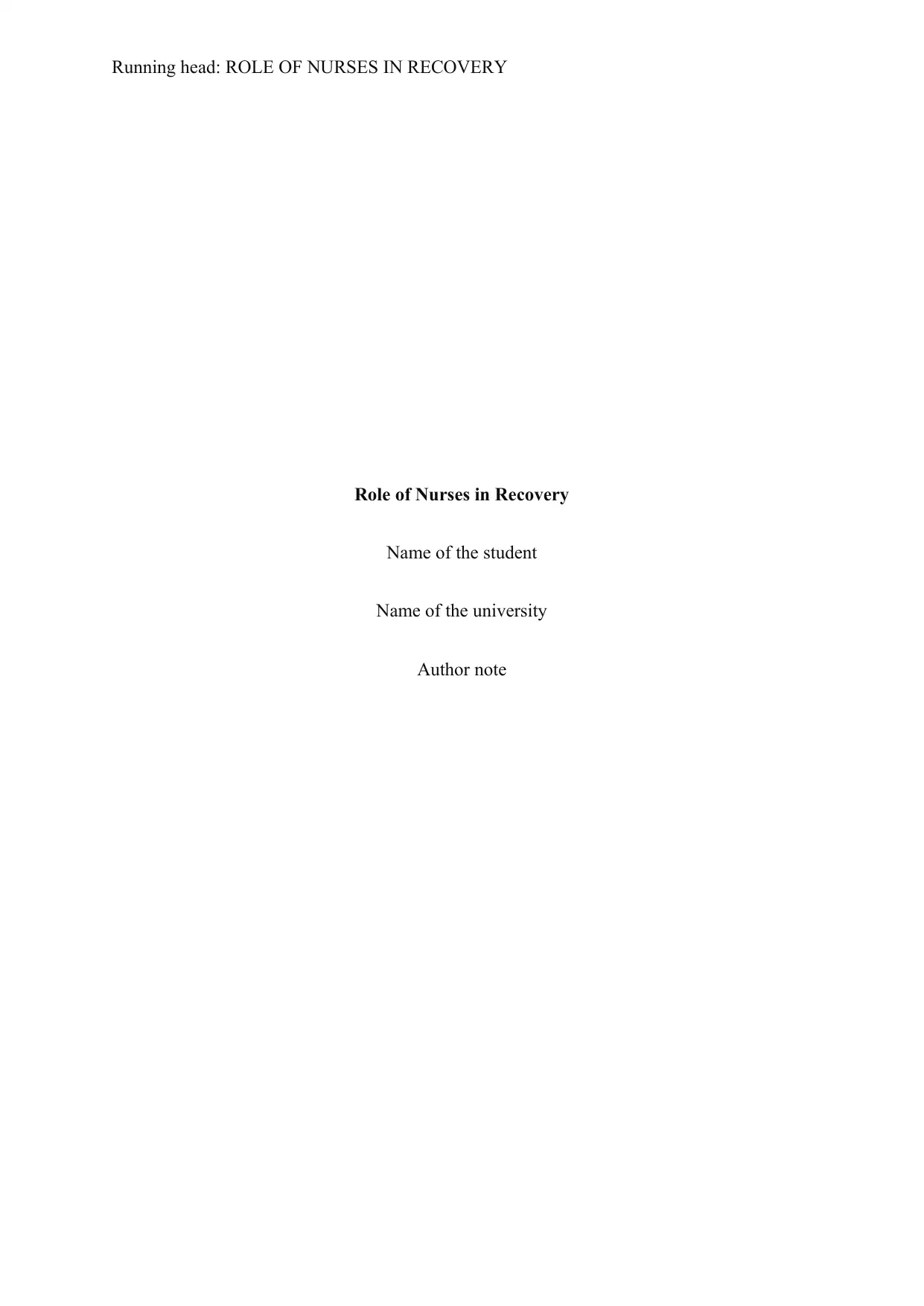
Running head: ROLE OF NURSES IN RECOVERY
Role of Nurses in Recovery
Name of the student
Name of the university
Author note
Role of Nurses in Recovery
Name of the student
Name of the university
Author note
Paraphrase This Document
Need a fresh take? Get an instant paraphrase of this document with our AI Paraphraser
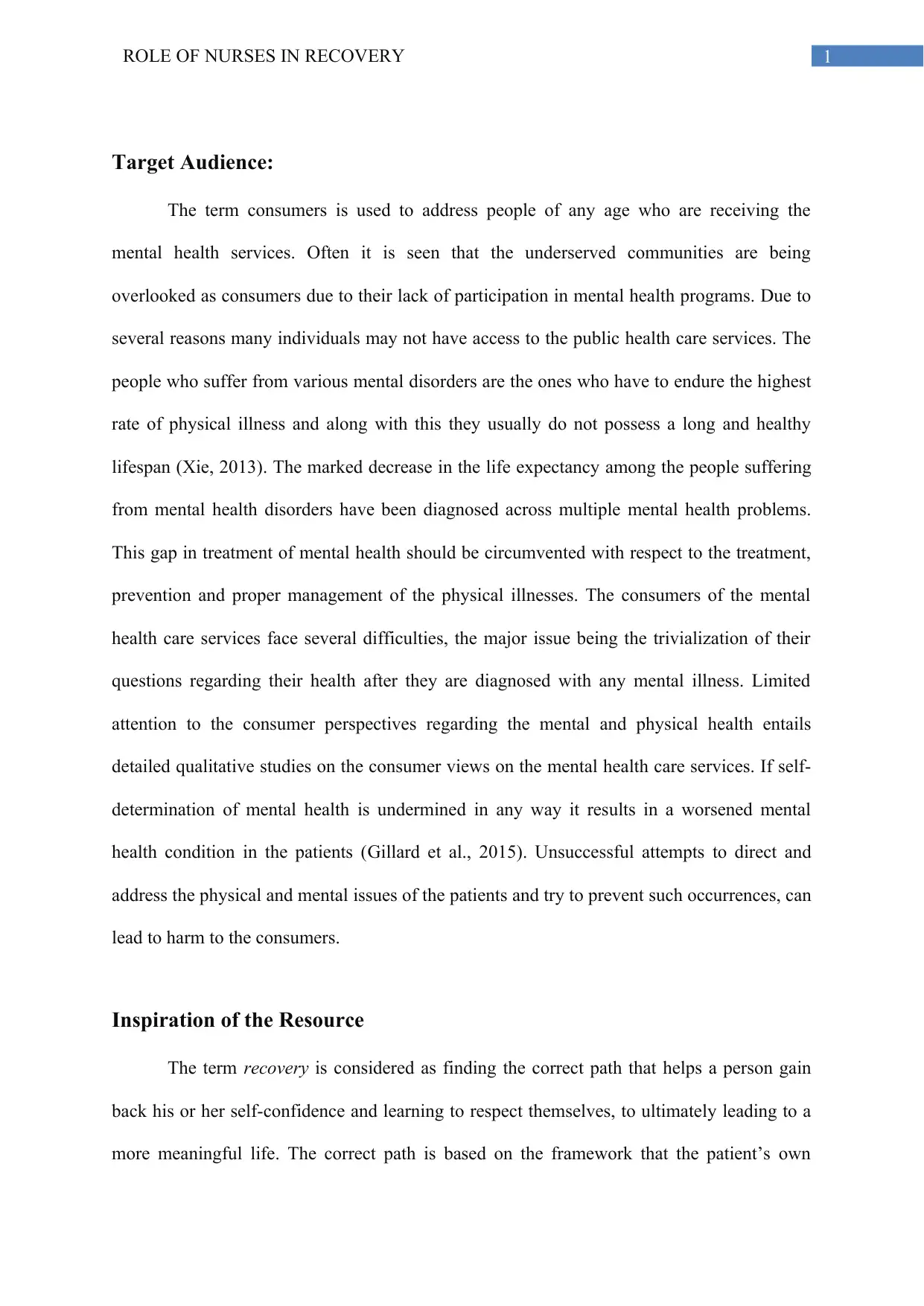
1ROLE OF NURSES IN RECOVERY
Target Audience:
The term consumers is used to address people of any age who are receiving the
mental health services. Often it is seen that the underserved communities are being
overlooked as consumers due to their lack of participation in mental health programs. Due to
several reasons many individuals may not have access to the public health care services. The
people who suffer from various mental disorders are the ones who have to endure the highest
rate of physical illness and along with this they usually do not possess a long and healthy
lifespan (Xie, 2013). The marked decrease in the life expectancy among the people suffering
from mental health disorders have been diagnosed across multiple mental health problems.
This gap in treatment of mental health should be circumvented with respect to the treatment,
prevention and proper management of the physical illnesses. The consumers of the mental
health care services face several difficulties, the major issue being the trivialization of their
questions regarding their health after they are diagnosed with any mental illness. Limited
attention to the consumer perspectives regarding the mental and physical health entails
detailed qualitative studies on the consumer views on the mental health care services. If self-
determination of mental health is undermined in any way it results in a worsened mental
health condition in the patients (Gillard et al., 2015). Unsuccessful attempts to direct and
address the physical and mental issues of the patients and try to prevent such occurrences, can
lead to harm to the consumers.
Inspiration of the Resource
The term recovery is considered as finding the correct path that helps a person gain
back his or her self-confidence and learning to respect themselves, to ultimately leading to a
more meaningful life. The correct path is based on the framework that the patient’s own
Target Audience:
The term consumers is used to address people of any age who are receiving the
mental health services. Often it is seen that the underserved communities are being
overlooked as consumers due to their lack of participation in mental health programs. Due to
several reasons many individuals may not have access to the public health care services. The
people who suffer from various mental disorders are the ones who have to endure the highest
rate of physical illness and along with this they usually do not possess a long and healthy
lifespan (Xie, 2013). The marked decrease in the life expectancy among the people suffering
from mental health disorders have been diagnosed across multiple mental health problems.
This gap in treatment of mental health should be circumvented with respect to the treatment,
prevention and proper management of the physical illnesses. The consumers of the mental
health care services face several difficulties, the major issue being the trivialization of their
questions regarding their health after they are diagnosed with any mental illness. Limited
attention to the consumer perspectives regarding the mental and physical health entails
detailed qualitative studies on the consumer views on the mental health care services. If self-
determination of mental health is undermined in any way it results in a worsened mental
health condition in the patients (Gillard et al., 2015). Unsuccessful attempts to direct and
address the physical and mental issues of the patients and try to prevent such occurrences, can
lead to harm to the consumers.
Inspiration of the Resource
The term recovery is considered as finding the correct path that helps a person gain
back his or her self-confidence and learning to respect themselves, to ultimately leading to a
more meaningful life. The correct path is based on the framework that the patient’s own
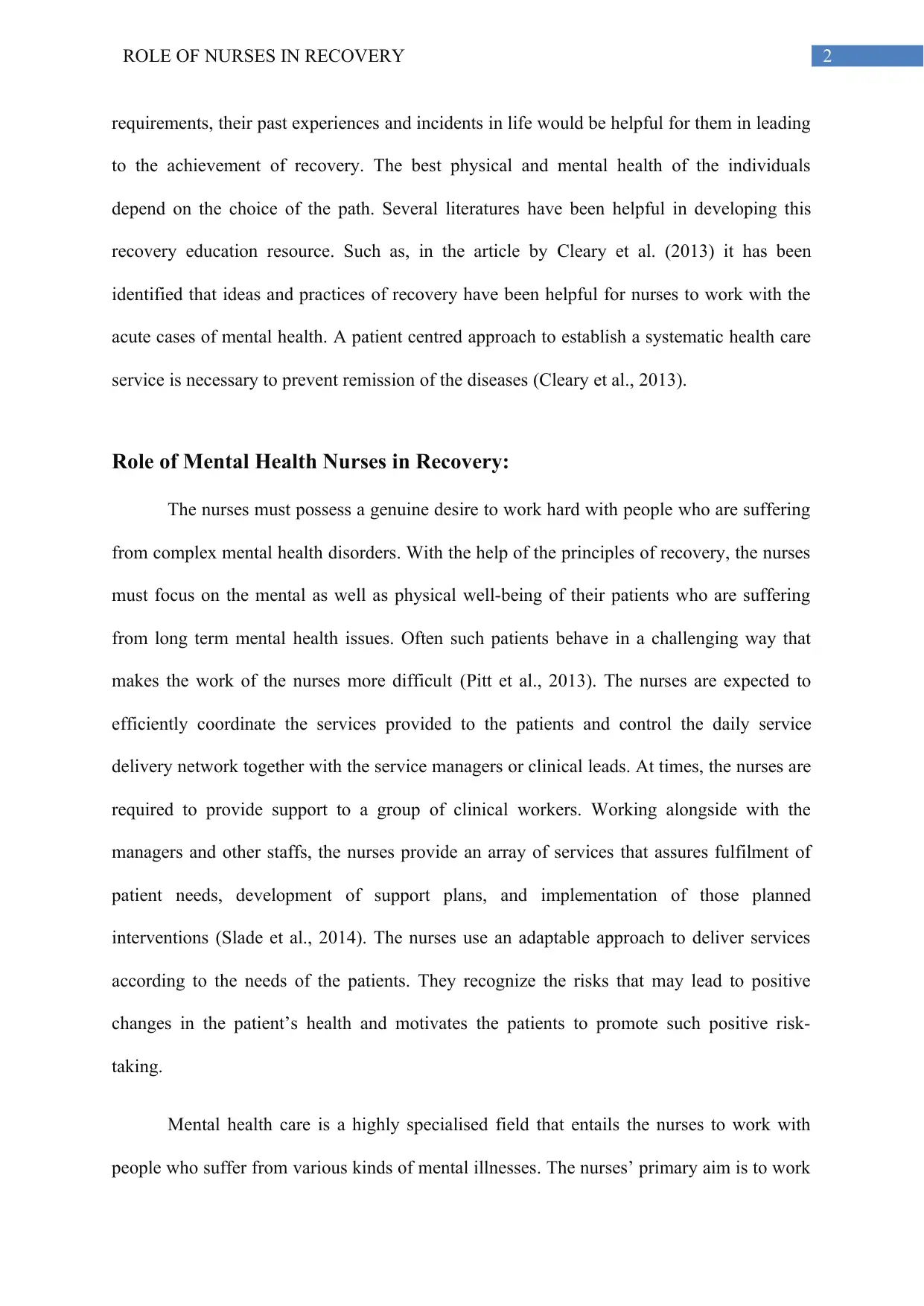
2ROLE OF NURSES IN RECOVERY
requirements, their past experiences and incidents in life would be helpful for them in leading
to the achievement of recovery. The best physical and mental health of the individuals
depend on the choice of the path. Several literatures have been helpful in developing this
recovery education resource. Such as, in the article by Cleary et al. (2013) it has been
identified that ideas and practices of recovery have been helpful for nurses to work with the
acute cases of mental health. A patient centred approach to establish a systematic health care
service is necessary to prevent remission of the diseases (Cleary et al., 2013).
Role of Mental Health Nurses in Recovery:
The nurses must possess a genuine desire to work hard with people who are suffering
from complex mental health disorders. With the help of the principles of recovery, the nurses
must focus on the mental as well as physical well-being of their patients who are suffering
from long term mental health issues. Often such patients behave in a challenging way that
makes the work of the nurses more difficult (Pitt et al., 2013). The nurses are expected to
efficiently coordinate the services provided to the patients and control the daily service
delivery network together with the service managers or clinical leads. At times, the nurses are
required to provide support to a group of clinical workers. Working alongside with the
managers and other staffs, the nurses provide an array of services that assures fulfilment of
patient needs, development of support plans, and implementation of those planned
interventions (Slade et al., 2014). The nurses use an adaptable approach to deliver services
according to the needs of the patients. They recognize the risks that may lead to positive
changes in the patient’s health and motivates the patients to promote such positive risk-
taking.
Mental health care is a highly specialised field that entails the nurses to work with
people who suffer from various kinds of mental illnesses. The nurses’ primary aim is to work
requirements, their past experiences and incidents in life would be helpful for them in leading
to the achievement of recovery. The best physical and mental health of the individuals
depend on the choice of the path. Several literatures have been helpful in developing this
recovery education resource. Such as, in the article by Cleary et al. (2013) it has been
identified that ideas and practices of recovery have been helpful for nurses to work with the
acute cases of mental health. A patient centred approach to establish a systematic health care
service is necessary to prevent remission of the diseases (Cleary et al., 2013).
Role of Mental Health Nurses in Recovery:
The nurses must possess a genuine desire to work hard with people who are suffering
from complex mental health disorders. With the help of the principles of recovery, the nurses
must focus on the mental as well as physical well-being of their patients who are suffering
from long term mental health issues. Often such patients behave in a challenging way that
makes the work of the nurses more difficult (Pitt et al., 2013). The nurses are expected to
efficiently coordinate the services provided to the patients and control the daily service
delivery network together with the service managers or clinical leads. At times, the nurses are
required to provide support to a group of clinical workers. Working alongside with the
managers and other staffs, the nurses provide an array of services that assures fulfilment of
patient needs, development of support plans, and implementation of those planned
interventions (Slade et al., 2014). The nurses use an adaptable approach to deliver services
according to the needs of the patients. They recognize the risks that may lead to positive
changes in the patient’s health and motivates the patients to promote such positive risk-
taking.
Mental health care is a highly specialised field that entails the nurses to work with
people who suffer from various kinds of mental illnesses. The nurses’ primary aim is to work
⊘ This is a preview!⊘
Do you want full access?
Subscribe today to unlock all pages.

Trusted by 1+ million students worldwide
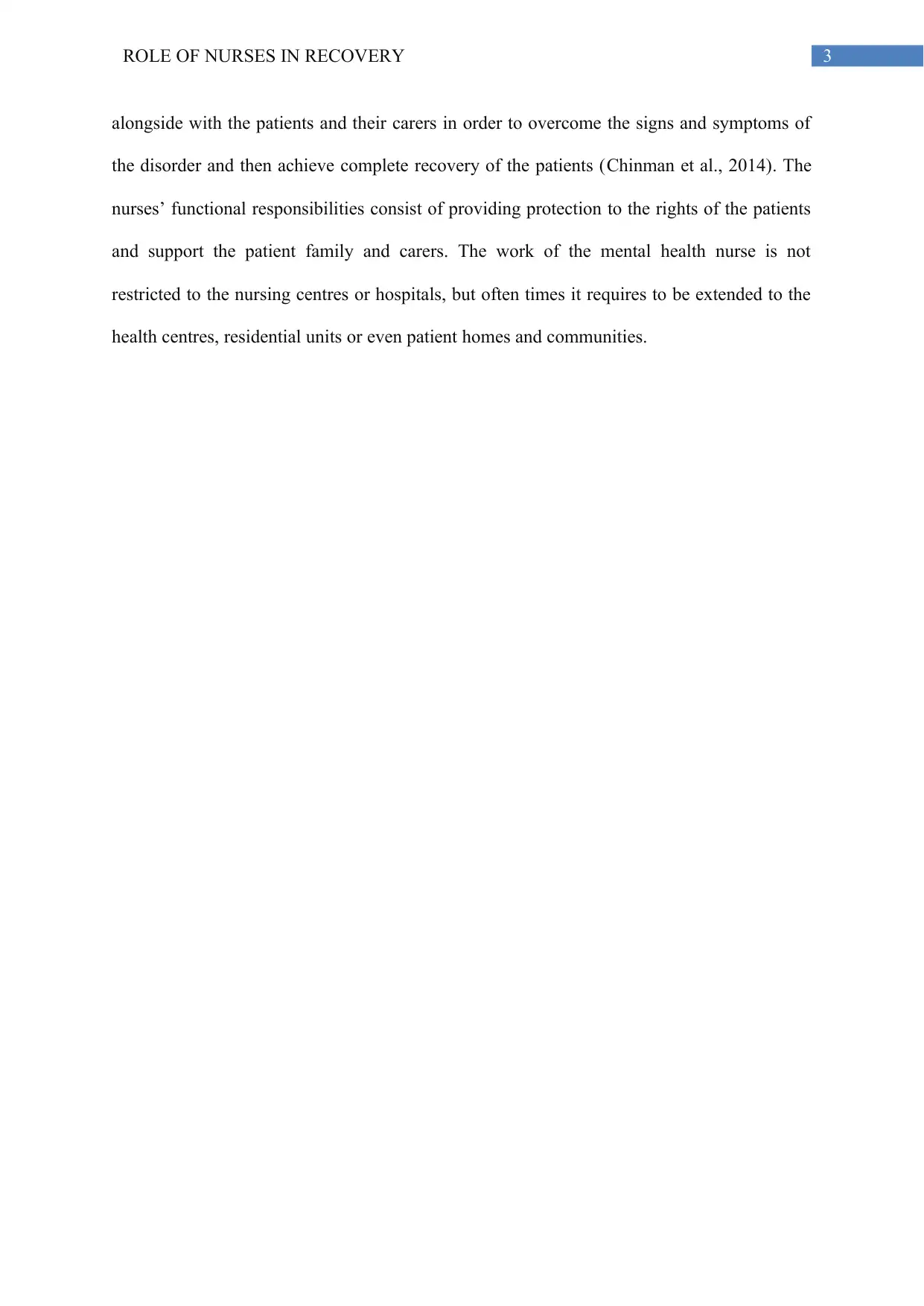
3ROLE OF NURSES IN RECOVERY
alongside with the patients and their carers in order to overcome the signs and symptoms of
the disorder and then achieve complete recovery of the patients (Chinman et al., 2014). The
nurses’ functional responsibilities consist of providing protection to the rights of the patients
and support the patient family and carers. The work of the mental health nurse is not
restricted to the nursing centres or hospitals, but often times it requires to be extended to the
health centres, residential units or even patient homes and communities.
alongside with the patients and their carers in order to overcome the signs and symptoms of
the disorder and then achieve complete recovery of the patients (Chinman et al., 2014). The
nurses’ functional responsibilities consist of providing protection to the rights of the patients
and support the patient family and carers. The work of the mental health nurse is not
restricted to the nursing centres or hospitals, but often times it requires to be extended to the
health centres, residential units or even patient homes and communities.
Paraphrase This Document
Need a fresh take? Get an instant paraphrase of this document with our AI Paraphraser
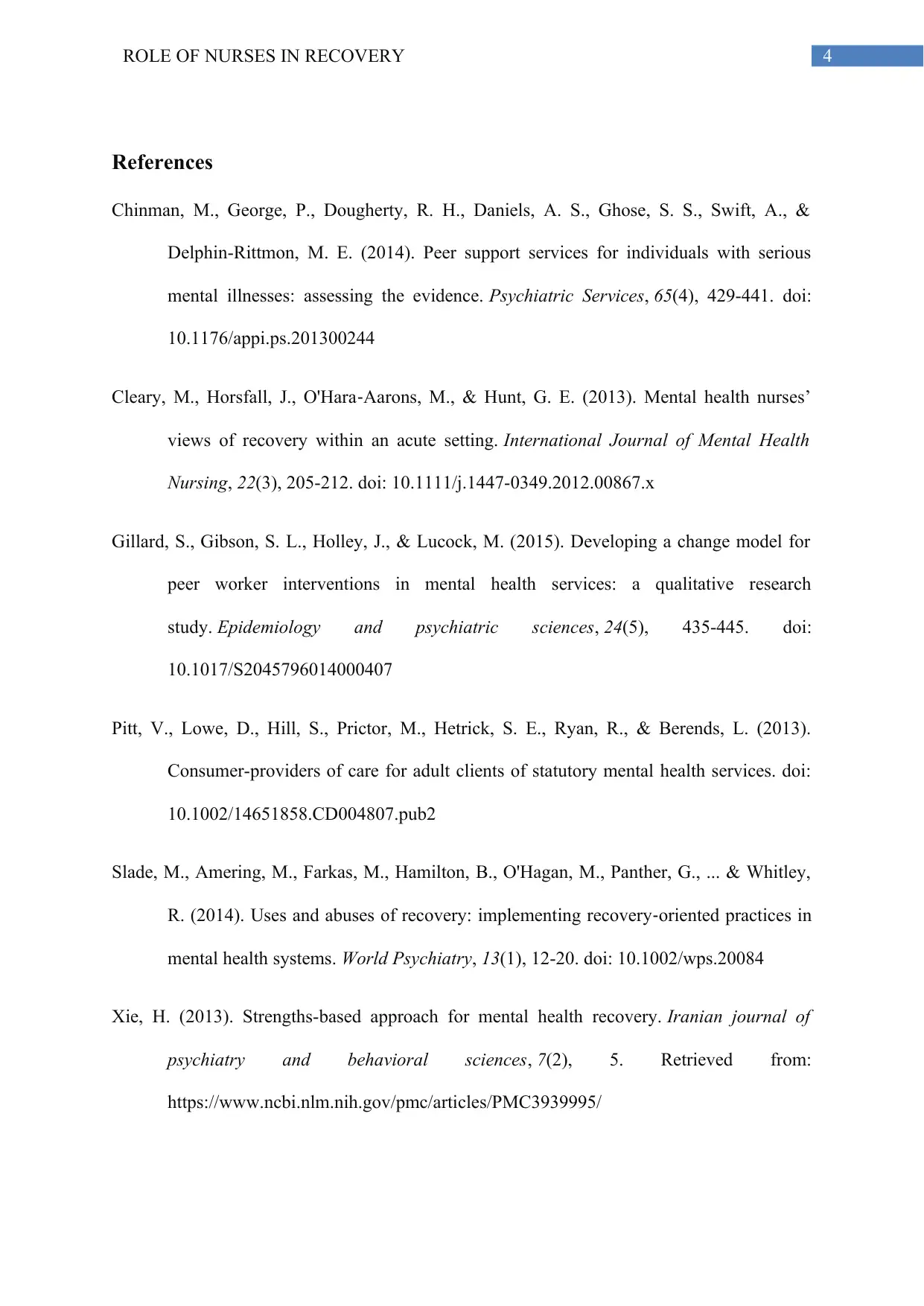
4ROLE OF NURSES IN RECOVERY
References
Chinman, M., George, P., Dougherty, R. H., Daniels, A. S., Ghose, S. S., Swift, A., &
Delphin-Rittmon, M. E. (2014). Peer support services for individuals with serious
mental illnesses: assessing the evidence. Psychiatric Services, 65(4), 429-441. doi:
10.1176/appi.ps.201300244
Cleary, M., Horsfall, J., O'Hara‐Aarons, M., & Hunt, G. E. (2013). Mental health nurses’
views of recovery within an acute setting. International Journal of Mental Health
Nursing, 22(3), 205-212. doi: 10.1111/j.1447-0349.2012.00867.x
Gillard, S., Gibson, S. L., Holley, J., & Lucock, M. (2015). Developing a change model for
peer worker interventions in mental health services: a qualitative research
study. Epidemiology and psychiatric sciences, 24(5), 435-445. doi:
10.1017/S2045796014000407
Pitt, V., Lowe, D., Hill, S., Prictor, M., Hetrick, S. E., Ryan, R., & Berends, L. (2013).
Consumer-providers of care for adult clients of statutory mental health services. doi:
10.1002/14651858.CD004807.pub2
Slade, M., Amering, M., Farkas, M., Hamilton, B., O'Hagan, M., Panther, G., ... & Whitley,
R. (2014). Uses and abuses of recovery: implementing recovery‐oriented practices in
mental health systems. World Psychiatry, 13(1), 12-20. doi: 10.1002/wps.20084
Xie, H. (2013). Strengths-based approach for mental health recovery. Iranian journal of
psychiatry and behavioral sciences, 7(2), 5. Retrieved from:
https://www.ncbi.nlm.nih.gov/pmc/articles/PMC3939995/
References
Chinman, M., George, P., Dougherty, R. H., Daniels, A. S., Ghose, S. S., Swift, A., &
Delphin-Rittmon, M. E. (2014). Peer support services for individuals with serious
mental illnesses: assessing the evidence. Psychiatric Services, 65(4), 429-441. doi:
10.1176/appi.ps.201300244
Cleary, M., Horsfall, J., O'Hara‐Aarons, M., & Hunt, G. E. (2013). Mental health nurses’
views of recovery within an acute setting. International Journal of Mental Health
Nursing, 22(3), 205-212. doi: 10.1111/j.1447-0349.2012.00867.x
Gillard, S., Gibson, S. L., Holley, J., & Lucock, M. (2015). Developing a change model for
peer worker interventions in mental health services: a qualitative research
study. Epidemiology and psychiatric sciences, 24(5), 435-445. doi:
10.1017/S2045796014000407
Pitt, V., Lowe, D., Hill, S., Prictor, M., Hetrick, S. E., Ryan, R., & Berends, L. (2013).
Consumer-providers of care for adult clients of statutory mental health services. doi:
10.1002/14651858.CD004807.pub2
Slade, M., Amering, M., Farkas, M., Hamilton, B., O'Hagan, M., Panther, G., ... & Whitley,
R. (2014). Uses and abuses of recovery: implementing recovery‐oriented practices in
mental health systems. World Psychiatry, 13(1), 12-20. doi: 10.1002/wps.20084
Xie, H. (2013). Strengths-based approach for mental health recovery. Iranian journal of
psychiatry and behavioral sciences, 7(2), 5. Retrieved from:
https://www.ncbi.nlm.nih.gov/pmc/articles/PMC3939995/

5ROLE OF NURSES IN RECOVERY
⊘ This is a preview!⊘
Do you want full access?
Subscribe today to unlock all pages.

Trusted by 1+ million students worldwide
1 out of 6
Related Documents
Your All-in-One AI-Powered Toolkit for Academic Success.
+13062052269
info@desklib.com
Available 24*7 on WhatsApp / Email
![[object Object]](/_next/static/media/star-bottom.7253800d.svg)
Unlock your academic potential
Copyright © 2020–2026 A2Z Services. All Rights Reserved. Developed and managed by ZUCOL.





